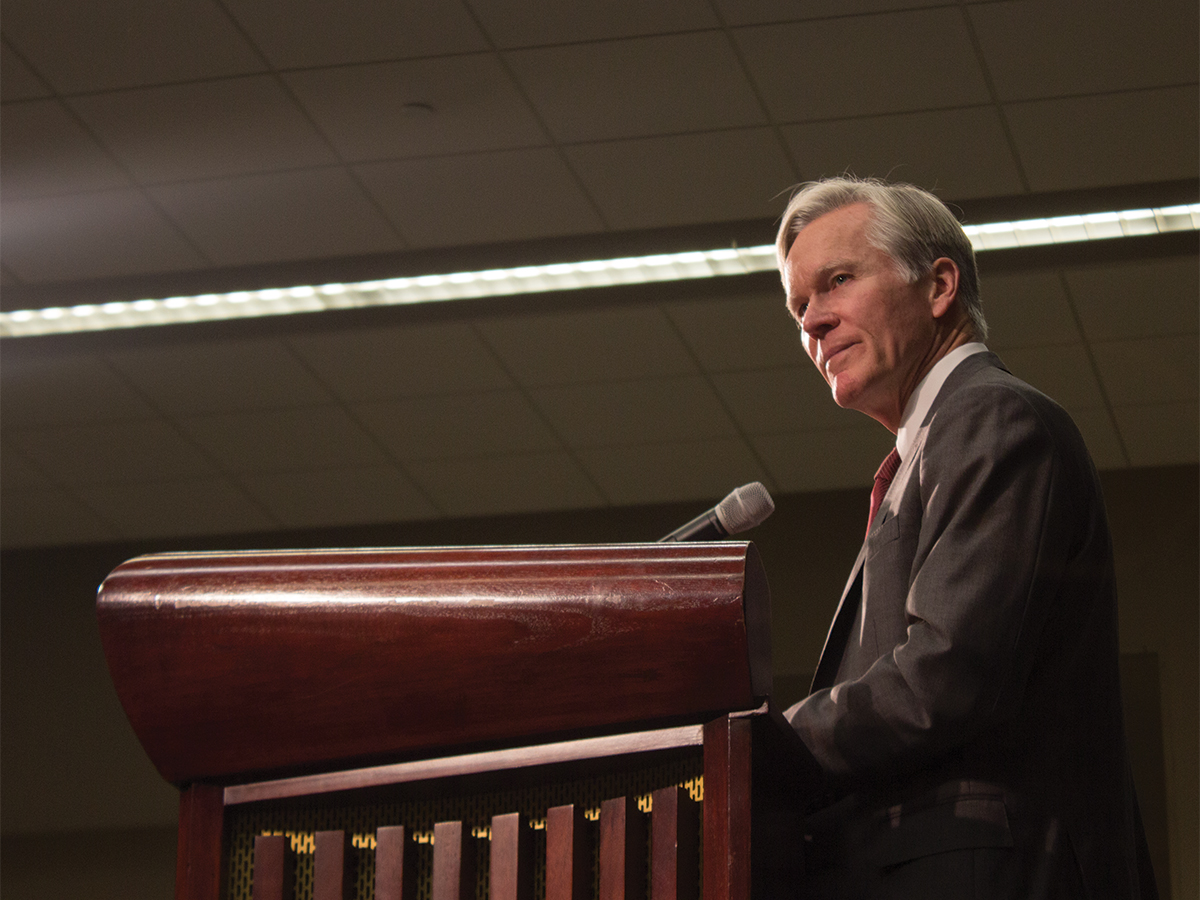
On Monday, March 6 at 7:30 p.m. in HUB 302, the 48th Hays Press-Enterprise lecture commenced with guest speaker Bill Keller, current editor-in-chief of the Marshall Project and former New York Times correspondent, editor, executive editor and op-ed columnist. His lecture, “The News Media in the Age of Trump,” focused on lessons to be learned from President Donald Trump’s hostility to the press after widespread disbelief and disdain was expressed by reporters and journalists following the nomination of the president.
Keller’s main question to the audience pondered whether “this idealistic notion of journalism as an impartial, empirical, open-minded undertaking makes sense anymore? Maybe we should have been out ringing doorbells for Democrats instead, or marching in the streets?” However, Keller stressed that journalists should not lose “their pose of objectivity and be partisans,” but rather comprehend that in this unique situation “our business is much to account for and we are in uncharted waters and it is an unsettling time.”
Keller went on to propose three lessons to be learned from the practice of journalism in the age of Trump. Keller’s first lesson requested that, “Before we (journalists) chase the next presidential tweet, before we assemble a panel of talking heads to predict how it plays out, maybe we should force ourselves to linger a little while over what happened today and why or go back to yesterday’s story and dig a little deeper.” However, especially in today’s digital age, he acknowledged the media’s overwhelming need to satisfy the accelerated pace of everything and the shortened attention span of the public. “The imperative to predict and anticipate the next news cycle consumes everyone,” Keller said. He concluded that this pushes journalists beyond reporting and into guessing “which means our (journalists’) credibility suffers” and “also makes it easier for a master showman like our president to change the subject.”
Keller’s second lesson suggested that “we (journalists) should rethink our love affair with data.” While he acknowledges “the sophisticated use of data as an indispensable tool of investigative and explanatory journalism,” he warns that “metrics of trending topics should be regarded with skepticism.”
According to Keller, 2016 statistics provided on average that the country was in “good shape” because of low unemployment, high trading figures and low crime rate, all of which boosted the media’s confidence that Hillary Clinton would win the 2016 presidential election.
He attributed the failure of the media’s portrayal of the election to their dependence on these metrics, which can be seen in examples where the polls failed to capture the breadth of Trump’s support in the rust belt, a once heavily industrial area of the Northeastern U.S. that suffered economic loss, population loss and urban decay.
Keller concluded that “we (journalists) failed to interrogate the data. So, I am all for data, but we shouldn’t be slaves to it.” Instead, he believes that we should personally interview and engage the people and the electorate, to hear the real story rather than relying solely on polls and other metrics.
Keller’s third lesson asked that “journalists and the news media must rebuild public trust, but not by polling our punches.” The public’s lack of trust in our current media, as Keller mentioned, must motivate journalists to “defend our (journalists’) credibility, our most important assets.” To achieve this, he suggests “(journalists) must do our job well by checking our facts, correcting our mistakes promptly and ungrudgingly and resisting the temptation to play the role Steve Bannon (Trump’s chief strategist) has chosen for us, the opposition party.” He also emphasized the importance of a journalist’s tone, because “the more tone sounds dismissive or snide or confrontational or morally superior,” the more that journalists will sound like Trump. Keller believes in the discipline of impartial “reporting that implies skeptical inquiry to all sides of an issue (…) I find journalism more credible if it starts with an open mind and follows the evidence.”
Keller concluded that despite the Trump administration’s stance on treating the truth as fungible, journalists still have an “immense and complicated news story to cover and a trustworthy independent press is more necessary than ever.” President Trump has made claims that the media is “the enemy of the people,” a source of “fake news” and “out of control,” and continued his lack of enthusiasm toward the media by blocking reporters from White House briefings and not attending the White House Correspondents dinner.
In the end, Keller believes, as the Trump administration continues its “war on truth,” journalists must persist and show how vital to a country it is to have a dependable source of information so that the people do not go powerless. “Speak truth to power, but speak it in calm, confident voices,” Keller said.








